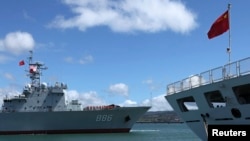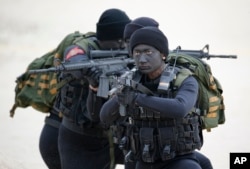China flexed a military muscle and hit at Taiwan’s foreign relations over the past month as warnings against closer ties with the United States, a long-time protector of self-rule on the island that Beijing considers its own. But so far Beijing is keeping more extreme retaliation measures in reserve.
In late December and again last week, a formation including the Liaoning aircraft carrier plied waters around Taiwan, which is 160 kilometers southeast of China. Last month, the African nation Sao Tome and Principe severed two decades of formal relations with Taiwan to recognize China. Last week Nigeria cut informal ties with Taiwan, saying it’s not a country.
Warnings from China
Those moves are meant to warn Taiwan President Tsai Ing-wen against growing closer with the United States since her surprise phone call Dec. 2 to U.S. President-elect Donald Trump and in light of her trip to the Americas Jan. 7-14, experts say. The United States sells Taiwan arms and has a law allowing it to help Taiwan defend itself.
But China has spared the more salient threats of the past in case Tsai cools toward the United States and seeks talks with Beijing, experts say.
“International space was given to Taiwan, quote unquote, and as someone born and brought up in Taiwan we hate to acknowledge that, but space was given to Taiwan on the basis of understanding that there is no tension across Taiwan Straits,” said Joanna Lei, chief executive officer of the Chunghua 21st Century think tank in Taiwan.
“Once that tension is increased, then it’s no denial that Taiwan’s international space will be reduced, and that will be something Tsai Ing-wen’s government has to grapple with and has to have a reaction to,” she said.
China sees Taiwan as part of China
China sees Taiwan as part of its territory, despite the island’s self-rule since the 1940s, and insists the two sides eventually unify. It worries that Taiwan’s autonomy will get a boost if Taiwanese leaders deepen relations overseas, especially with the United States.
In 1995 and 1996, China fired missiles into the Taiwan Strait in what was seen then as an attempt to discourage Taiwanese from electing an anti-Beijing president. As late as 2005, senior Chinese officials threatened to use force against Taiwan if needed.
People of Taiwan react
But those measures fanned anti-China sentiment in Taiwan, helping to install presidents who vowed to stand up to Beijing. Tsai, in office since May, has frustrated China for her unwillingness to hold talks on grounds that both sides belong to one country. But she has kept her tone toward Beijing polite, avoiding words or actions to upset it.
Beijing is expected to avoid more drastic measures, such as buying off a series of Taiwan’s remaining 21 diplomatic allies or testing missiles, but continue with milder threats.
China waiting on Trump
“China must fear President-elect Trump because of Trump's unpredictability,” said Coen Blaauw, executive director of the Washington-based, pro-Taiwan advocacy group Formosan Association for Public Affairs. “They must feel they need to do something in response to recent signals from the Trump camp in support of Taiwan, but stopping short of conducting missile tests.
“So sailing the Liaoning aircraft carrier through the Taiwan Strait was probably the strongest signal they could think of given the circumstances,” he said. “It is hard to imagine China going beyond that.”
The cut in ties with Sao Tome and Principe still leaves Taiwan enough foreign allies to give it a voice in the United Nations, where China blocks Taiwan itself from participation. Nigeria did not have a diplomatic relationship and does not rank among Taiwan’s top trading partners.
Tsai’s travels this month took her to four Central American countries where she tightened relations.
The aircraft carrier, which passed through the Taiwan Strait Wednesday en route to northern China, entered Taiwan’s air defense identification zone, but avoided its territorial seas.
Economic pressure
The number of group tourists from China to Taiwan declined 27 percent from May, when Tsai took office, over the following five months. The trend, which first began around the time of Tsai’s January 2016 election, is seen as pressure by Beijing to pinch the island’s economy without a more severe hit, such as cancelling trade or investment deals.
Beijing may be watching now what follows Tsai’s meeting Jan. 8 with Republican Senator Ted Cruz. The encounter may have built a bridge with the party that won control of the U.S. Congress in November. Tsai’s 12-minute phone call to Trump in early December outraged China, which had grown used to U.S. leaders shunning contact with Taipei since the 1970s.
Washington broke formal ties with Taiwan in 1979 in favor of the larger and faster-growing China.
A stronger link with Trump following Tsai’s call December 2 could bring Taiwan more military exchanges and more access to advanced weapons for defense against China. Taiwanese leaders also want a free trade deal that would help local exporters.
The warnings are seen as soft so far – they have incited little sustained outrage or fear in Taiwan – but could escalate if Taiwan's president does anything new that offends China.
“She’s not taking any chance, so that’s why she’s holding herself back. It’s her view that it’s better not to really irritate China more,” said Shane Lee, political scientist at Chang Jung Christian University in Taiwan.
But some people in her Democratic Progressive Party, which includes a hard-line anti-China faction, hope for less holding back. Others in Taiwan want stronger China ties to boost trade and investment. “She is facing a lot of pressure from both within the party and from the society in general,” Lee said.













